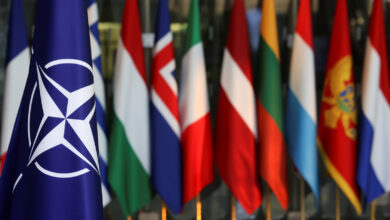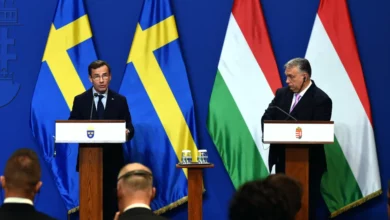Ajdabiyah — Libyan rebels came under fire on the outskirts of Ajdabiyah on Sunday, forcing them back in to their eastern outpost and denting their hopes of pushing west to try to end a stalemate in the Libyan war.
One witness said he saw around a dozen rockets land near the western entrance to town, which rebels wanted to use as a staging post to retake the oil port of Brega. Many fled as loud explosions boomed across the town.
"There are still some guys out there at the western gate but the situation isn't very good," said Wassim el-Agouri, a 25-year-old rebel volunteer waiting at Ajdabiyah's eastern gate.
Some rebels on Saturday made it into the outskirts of Brega, 50 miles to the west, but many others retreated to Ajdabiyah after six were killed by rockets fired by Qadhafi loyalists on the exposed coastal road joining the two towns.
By Sunday, scores of volunteer fighters and civilian cars carrying men, women and children streamed east from Ajdabiyah up the coast road toward Benghazi, where the popular revolt against Qadhafi's 41-year rule began on 17 February.
Sunday marks a month since the UN Security Council passed a resolution authorizing force to protect civilians in Libya, leading to an international air campaign.
But despite NATO air strikes against Qadhafi's armor, rebels have been unable to hold gains in weeks of back-and-forth fighting over the coastal towns in eastern Libya.
In western Libya, the rebel-held city of Misrata has been besieged for seven weeks, leading to a growing humanitarian crisis. Hundreds of civilians are believed to have died in fighting and bombing in the city.
A rebel spokesman said Qadhafi's forces shelled Misrata again on Sunday, killing at least six people. Abdel Basset Mezerik said at least 47 people were also wounded.
The United States, France and Britain said last week they would not stop bombing Qadhafi's forces until he left power.
HEAVY WEAPONS
With NATO troops bogged down in Afghanistan, Western countries have however ruled out sending ground troops, a position reinforced by the British prime minister on Sunday.
"What we've said is there is no question of invasion or an occupation — this is not about Britain putting boots on the ground," David Cameron told Sky News in an interview.
But he said outside powers would help in every other way to stop Qadhafi "unleashing this hell on people in Misrata" and other towns up and down the Libyan coast, including providing "non-lethal equipment" to the rebels.
The rebels have called repeatedly for heavier arms, saying their machineguns and rocket-propelled grenades are not able to stop government tanks and artillery.
"We want weapons, modern weapons," said rebel Ayman Aswey, 21. "If we had those, we could advance against them."
Ajdabiyah's streets were almost deserted by mid-afternoon and rebels had begun barricading the road through the town with concrete blocks, tree branches, trash bins and anything else they could find for fear of an attack by Qadhafi's forces.
Rebel pick-ups patrolled the streets and men took up positions across the town with machineguns and rocket-propelled grenade launchers. Others returned to positions at the western gate with their weapons pointed west and south into the desert.
"We are ready for a street war. We are prepared. We have got dynamite and we've got grenades," said rebel fighter Emtar al-Farjany, who was holding a stick of dynamite.
Earlier on Sunday a sandstorm obscured the flat expanse of desert stretching west to Brega. Rebel fighter Ahmed al-Zuwaihi blamed the weather for a lack of air strikes by NATO warplanes.
"The weather is no good today. NATO hasn't hit anything," he said. "It's a big opportunity for Qadhafi and he's taking advantage of it. He might enter Ajdabiyah today. Today the planes are not going to hit anything."
NATO warplanes instead bombed the area of Hira, 50km (30 miles) southwest of the capital Tripoli on Sunday and also hit the city of Sirte, Libyan state television said.
Days of sporadic clashes on the road west to Brega have failed to break a deadlock in the fighting. Rebel officials said on Saturday that their most experienced soldiers were clashing with Qadhafi's forces on the edge of Brega.
But the front line is hard to locate due to the hit-and-run style of fighting, long-distance shelling and the growing tendency of Qadhafi's followers to launch flanking maneuvers and ambush less experienced rebel fighters on the coastal road.
The rebels pushed hundreds of kilometers toward the capital Tripoli in late March after foreign warplanes began bombing Qadhafi's positions to protect civilians, but proved unable to hold territory and were pushed back as far as Ajdabiyah.
SNIPERS
In Misrata, rebels say they have faced daily bombardment from Qadhafi's forces. The US-based rights group Human Rights Watch has also accused Qadhafi's forces of using cluster bombs — which scatter bomblets over a wide area, increasing civilian casualties. The Libyan government has rejected the allegations.
A rebel spokesman, called Abdelsalam, said there was fighting around Misrata's main thoroughfare Tripoli Street.
"Snipers are firing in all directions," he said. "For three days, it was very tough. Qadhafi troops were launching powerful attacks. They have been firing artillery, mortars."
Food was running short and long queues formed outside bakeries. Some streets were fast becoming unrecognizable.
Hundreds of Libyans fled attacks by government forces in the mountainous region southwest of Tripoli and crossed into neighboring Tunisia on Sunday. The region, including the town of Nalut, is populated by Berbers, an ethnic group traditionally viewed with suspicion by Qadhafi's government.
Mohamed, a Libyan from Nalut, said he had just arrived with his family at the Tunisian border crossing.
"There is random bombardment on Nalut. All residents in Nalut are coming here to flee," he said.
Aissa, from the same town, said: "I'm part of a convoy which included about 500 people fleeing death."
The Libyan government blames militants allied to Al-Qaeda for the fighting. Foreign Minister Abdelati Obeidi held talks with UN envoy Abdelilah al-Khatib in Tripoli and condemned "the unjustified crusader colonial aggression on Libya."
He said Libya was ready to comply with UN resolutions to implement a ceasefire and allow the delivery of humanitarian aid, according to the Jana state news agency.




